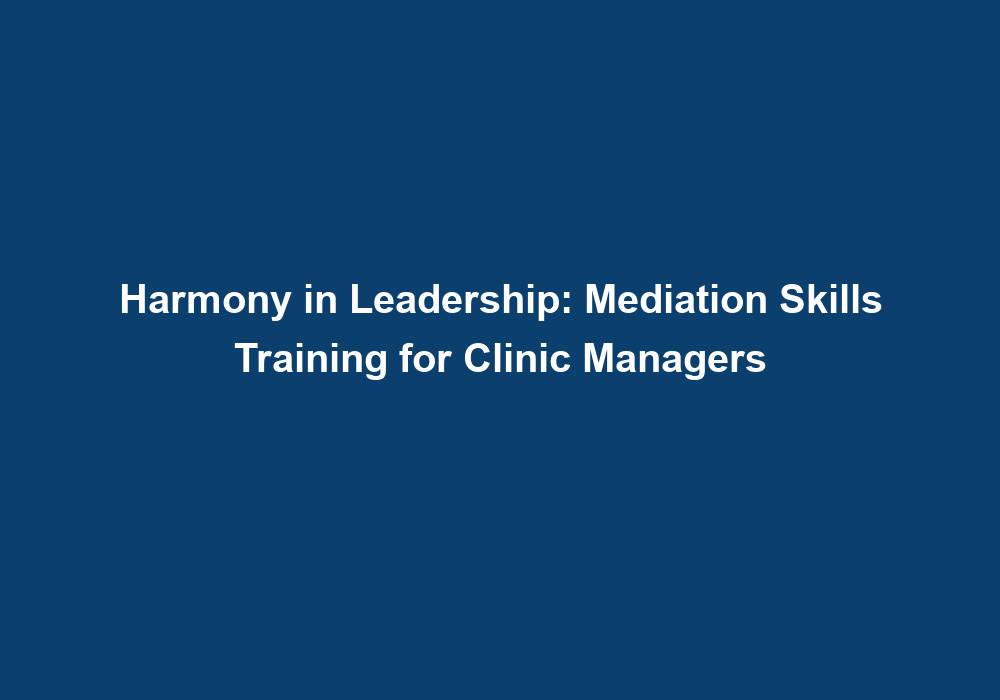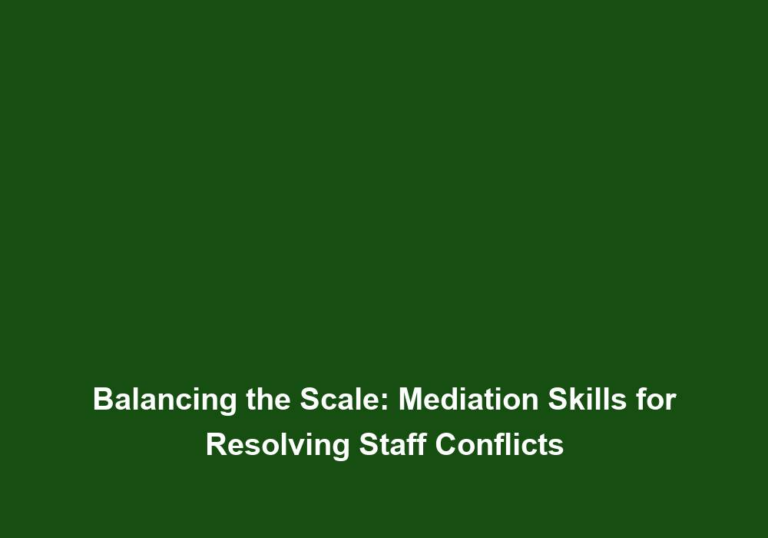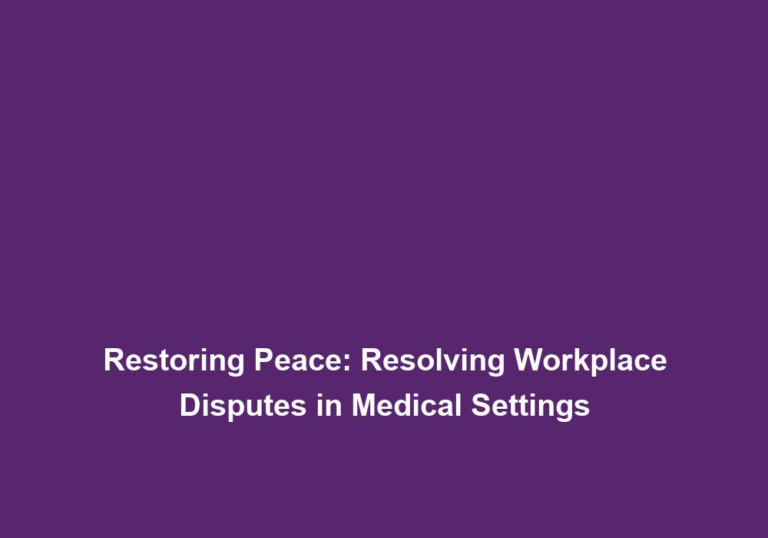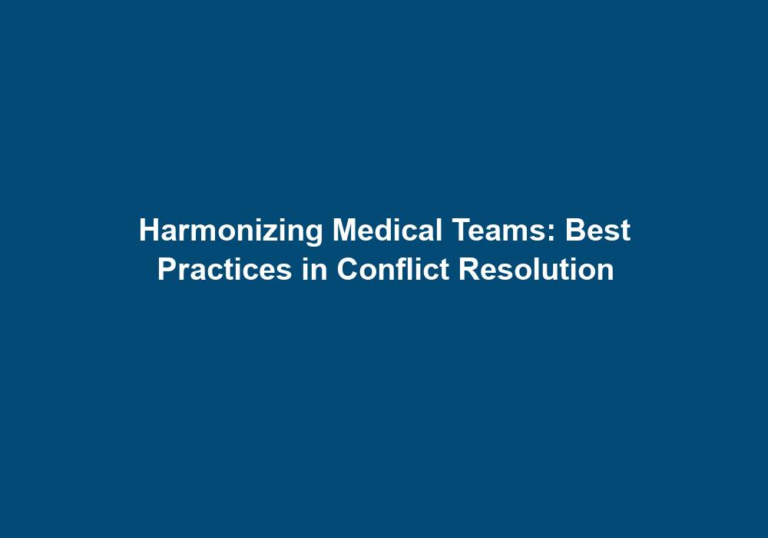Harmony in Leadership: Mediation Skills Training for Clinic Managers
In today’s fast-paced healthcare industry, clinic managers play a vital role in ensuring the smooth operation and success of their clinics. Effective leadership skills are crucial in managing a team of healthcare professionals, but equally important is the ability to mediate conflicts and foster harmony among team members. This article will explore the significance of mediation skills training for clinic managers and provide valuable insights into how these skills can be developed and applied in real-life scenarios.
The Importance of Mediation Skills for Clinic Managers
- Promoting a Positive Work Environment:
As a clinic manager, one of your primary responsibilities is to create a positive work environment where all team members feel valued and respected. By enhancing your mediation skills, you can effectively manage conflicts and prevent them from escalating, thereby fostering a harmonious workplace.
- Foster open communication: Mediation skills enable clinic managers to create an atmosphere of open communication, where team members feel comfortable expressing their concerns and ideas. This fosters a sense of trust and collaboration among the team.
- Address conflicts promptly: With strong mediation skills, clinic managers can address conflicts promptly and proactively. By resolving conflicts early on, managers can prevent them from negatively impacting the work environment and team dynamics.
- Encourage a culture of respect: Mediation skills help clinic managers promote a culture of respect and empathy within the clinic. By actively listening to team members and valuing their perspectives, managers can create a work environment where everyone feels heard and appreciated.
- Enhancing Team Collaboration:
Conflict is inevitable, especially in a high-stress environment like a clinic. However, conflicts can be opportunities for growth and innovation if handled appropriately. Mediation skills enable clinic managers to facilitate open communication, encourage active listening, and promote collaboration among team members, ultimately leading to improved patient care outcomes.
- Foster teamwork and synergy: Mediation skills empower clinic managers to foster teamwork and synergy among team members. By encouraging collaboration and shared decision-making, managers can harness the collective expertise of the team to drive better patient outcomes.
- Identify underlying issues: Through effective mediation, clinic managers can identify the underlying issues causing conflicts within the team. By addressing these root causes, managers can help team members understand each other’s perspectives and work towards mutually beneficial solutions.
- Encourage creativity and innovation: Mediation skills enable clinic managers to create an environment that encourages creativity and innovation. By facilitating constructive discussions and brainstorming sessions, managers can inspire team members to think outside the box and explore new approaches to patient care.
- Reducing Employee Turnover:
A hostile or tense work environment can significantly increase employee turnover, which can be costly and disruptive to clinic operations. By addressing conflicts promptly and effectively, clinic managers can contribute to a positive workplace culture, leading to higher employee satisfaction and retention rates.
- Build trust and loyalty: Mediation skills help clinic managers build trust and loyalty among team members. By handling conflicts with fairness and impartiality, managers can create an environment where employees feel valued and supported.
- Recognize and address individual needs: Through effective mediation, clinic managers can recognize and address the individual needs of team members. By understanding their concerns and providing appropriate support, managers can foster a sense of belonging and job satisfaction, reducing the likelihood of turnover.
- Encourage professional growth: Mediation skills enable clinic managers to support the professional growth and development of team members. By providing constructive feedback and opportunities for skill enhancement, managers can create a positive work environment that encourages employees to stay and grow within the clinic.
Developing Mediation Skills for Clinic Managers
1. Education and Training Programs:
Investing in formal education and training programs focused on conflict resolution and mediation can greatly enhance a clinic manager’s ability to handle conflicts effectively. These programs equip managers with theoretical knowledge and practical skills necessary for successful mediation, such as active listening, empathy, and negotiation techniques.
- Understand conflict dynamics: Education and training programs provide clinic managers with a deep understanding of conflict dynamics and the psychology behind them. This knowledge helps managers navigate conflicts more effectively and identify strategies for resolution.
- Learn effective communication techniques: Mediation training programs teach clinic managers effective communication techniques, such as active listening, paraphrasing, and non-verbal cues. These skills enable managers to establish rapport, build trust, and facilitate productive discussions during conflict resolution.
- Gain negotiation skills: Mediation training equips clinic managers with negotiation skills, allowing them to find mutually beneficial solutions to conflicts. Managers learn techniques to identify common interests, explore creative options, and reach agreements that satisfy all parties involved.
2. Role-playing and Simulation Exercises:
Practicing mediation scenarios through role-playing exercises can provide clinic managers with hands-on experience in managing conflicts. By simulating real-life situations, managers can develop their problem-solving abilities, learn to identify underlying issues, and apply appropriate mediation techniques. Role-playing also allows for receiving feedback from peers or mentors, aiding in continual improvement.
- Develop problem-solving skills: Role-playing exercises allow clinic managers to develop their problem-solving skills in a safe and controlled environment. Managers can practice different approaches to conflict resolution, assess the outcomes, and refine their strategies accordingly.
- Enhance empathy and perspective-taking: Role-playing scenarios help clinic managers enhance their empathy and perspective-taking skills. By stepping into the shoes of different parties involved in a conflict, managers can gain a deeper understanding of their perspectives and emotions, facilitating more effective mediation.
- Practice active listening and communication: Role-playing exercises provide an opportunity for clinic managers to practice active listening and effective communication techniques. Managers can learn to ask open-ended questions, paraphrase information accurately, and respond empathetically to foster better understanding and resolution.
3. Mentorship and Coaching:
Pairing clinic managers with experienced mentors or coaches who possess strong mediation skills can be highly beneficial. Mentors can provide guidance, share personal experiences, and offer insights into successful conflict resolution strategies. Regular meetings with mentors can help clinic managers refine their mediation techniques and build confidence in handling various conflict situations.
- Gain practical wisdom: Mentors with extensive experience in conflict resolution can provide clinic managers with practical wisdom and advice. They can share real-life examples, pitfalls to avoid, and strategies for successful mediation, enabling managers to learn from their expertise.
- Receive personalized feedback and support: Mentorship allows clinic managers to receive personalized feedback and support tailored to their specific needs. Mentors can observe managers’ mediation approaches, identify areas for improvement, and provide guidance on enhancing their skills.
- Develop confidence and self-awareness: Through mentorship, clinic managers can develop confidence in their mediation abilities and gain self-awareness of their strengths and areas for growth. Mentors can help managers navigate challenging situations, build resilience, and overcome self-doubt.
4. Continual Learning and Professional Development:
Conflict resolution and mediation techniques are continually evolving. It is essential for clinic managers to stay updated with the latest practices and theories in the field. This can be achieved through attending conferences, workshops, webinars, or joining professional organizations dedicated to conflict resolution. By continuously expanding their knowledge and skills, clinic managers can effectively adapt to new challenges and stay ahead in their roles.
- Stay informed about industry trends: Continual learning enables clinic managers to stay informed about emerging trends and best practices in conflict resolution. Managers can learn about new mediation techniques, research findings, and innovative approaches to enhance their skills and improve outcomes.
- Network with peers and experts: Professional development opportunities provide clinic managers with a platform to network with peers and experts in the field of conflict resolution. By exchanging ideas, sharing experiences, and learning from others, managers can broaden their perspectives and gain insights into different mediation strategies.
- Access additional resources and support: Attending conferences, workshops, and webinars allows clinic managers to access additional resources and support materials. They can learn from renowned experts, access research papers, and discover tools and frameworks that can further enhance their mediation skills.
Applying Mediation Skills in Real-Life Scenarios
- Open Communication Channels:
Establishing open lines of communication among team members is crucial for effective conflict resolution. Clinic managers should encourage an open-door policy, regular team meetings, and provide platforms for anonymous feedback. By fostering an environment where individuals feel comfortable expressing their concerns, potential conflicts can be identified and addressed early on.
- Encourage regular team meetings: Clinic managers should schedule regular team meetings where team members can openly discuss their concerns, share updates, and provide feedback. This promotes transparency and ensures that conflicts are addressed in a timely manner.
- Create a safe space for feedback: Managers should create a safe and non-judgmental space where team members can provide anonymous feedback. This allows individuals to express their concerns without fear of repercussions, enabling managers to identify potential conflicts and address them proactively.
- Implement an open-door policy: Clinic managers should establish an open-door policy, encouraging team members to approach them with any issues or conflicts they may be experiencing. This open communication channel fosters trust and enables managers to intervene early on to prevent conflicts from escalating.
- Active Listening:
Actively listening to all parties involved in a conflict is essential for understanding their perspectives and needs. Clinic managers should practice active listening techniques, such as paraphrasing and reflecting, to ensure that all parties feel heard and validated. This can help in uncovering the underlying issues and finding mutually beneficial solutions.
- Practice empathetic listening: Clinic managers should practice empathetic listening, putting themselves in the shoes of the individuals involved in a conflict. This helps managers understand their emotions, concerns, and motivations, leading to more effective mediation.
- Use reflective techniques: Reflective techniques, such as paraphrasing and summarizing, allow clinic managers to demonstrate their understanding of the concerns raised by team members. This conveys empathy and helps in clarifying any misunderstandings or miscommunications.
- Validate emotions and perspectives: Active listening involves validating the emotions and perspectives of all parties involved in a conflict. Clinic managers should acknowledge the feelings and viewpoints expressed by team members, creating an environment where everyone feels valued and respected.
- Neutral Facilitation:
As a mediator, clinic managers should strive to remain neutral and unbiased throughout the conflict resolution process. By refraining from taking sides, managers can create an atmosphere of fairness and impartiality. This approach encourages trust-building and facilitates productive discussions between conflicting parties.
- Avoid taking sides: Clinic managers should avoid favoritism or bias when mediating conflicts. By remaining neutral, managers create an environment where all parties feel that their concerns are being heard and considered.
- Ensure equal opportunity for all voices: Neutral facilitation involves ensuring that all parties involved in a conflict have an equal opportunity to express their perspectives and concerns. Clinic managers should create a safe space where everyone feels comfortable sharing their thoughts without fear of judgment or retribution.
- Focus on common goals and interests: By redirecting the focus towards common goals and interests, clinic managers can help conflicting parties find common ground. This approach encourages collaboration and cooperation, leading to more constructive and mutually beneficial resolutions.
- Collaborative Problem-Solving:
Mediation skills enable clinic managers to guide conflicting parties towards collaborative problem-solving. Encouraging individuals to focus on shared goals and interests rather than their differences can lead to win-win solutions. This approach fosters a sense of ownership among team members and paves the way for long-term harmony within the clinic.
- Identify shared goals and interests: Clinic managers should facilitate discussions to identify shared goals and interests among conflicting parties. By finding common ground, managers can redirect the focus towards achieving mutually beneficial outcomes.
- Encourage brainstorming and creativity: Mediation skills allow clinic managers to foster an environment of brainstorming and creativity during conflict resolution. By encouraging individuals to explore innovative solutions and think outside the box, managers can unlock new possibilities for resolving conflicts.
- Facilitate consensus-building: Clinic managers should facilitate consensus-building among conflicting parties by encouraging active participation and collaboration. By guiding the discussion and helping individuals find areas of agreement, managers can lead the way towards win-win resolutions.
Conclusion
Mediation skills training for clinic managers is indispensable in today’s healthcare landscape. By effectively managing conflicts, clinic managers can promote a positive work environment, enhance team collaboration, and reduce employee turnover. Developing mediation skills through education, role-playing, mentoring, and ongoing professional development is essential. Applying these skills in real-life scenarios through open communication, active listening, neutral facilitation, and collaborative problem-solving can lead to a harmonious and successful clinic.







